Why Denis Villenueve’s upcoming version of Dune has us crazy excited
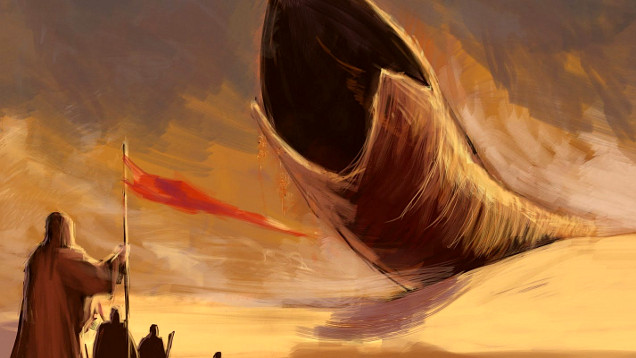
What is all this hullabaloo about Dune, we hear you ask? Critic Travis Johnson traces the journey so far in bringing Frank Herbert’s classic novel to the screen – and explains why we’re crazy excited about Denis Villeneuve’s upcoming adaptation.
If you ever want a decent snapshot of what currently passes for the Old Hollywood/New Hollywood divide, compare the two most star-packed casts currently sending film fans into anticipatory paroxysms: Quentin Tarantino’s Once Upon a Time in Hollywood and Denis Villeneuve’s Dune.
While the cast of QT’s ’60s-set epic is nothing to sneeze at (Leonardo DiCaprio, Brad Pitt, Margot Robbie, Emile Hirsch and Al Pacino all have key roles, with the ensemble including Kurt Russell, Bruce Dern, Lena Dunham, and Tarantino regulars Tim Roth and Michael Madsen) it’s all bit safe, isn’t it? These are the people you’d expect to find in a Tarantino joint, actors of a caliber that a filmmaker like him can attract.
That’s because – though it’s hard for people who came up in the ‘90s (your author of the day included, folks) – Quentin Tarantino is old school now. He’s part of the machinery. Still a sublimely gifted filmmaker, have no doubt, but c’mon – it’s not like we’re about to be blown away by a paradigm-shifter like Pulp Fiction later this year. We have a pretty good fix on the sort of movie we’re gonna get with Once Upon a Time in Hollywood.
Dune, though? Dune is wild. Lord knows what that thing’s gonna look like. And that’s exciting as hell.
It feels weird describing French-Canadian director Denis Villeneuve as a young turk – the guy is 51 – but he’s only risen to prominence in mainstream cinema over the past few years. Certainly, if you kept an eye on international cinema you’d know who he was, if for no other reason than his acclaimed 2010 film, Incendies. His first two English language films, Prisoners and Enemy (both 2013), received strong notices but little commercial attention. And then he did Sicario (2015), Arrival (2016), and, of course, Blade Runner 2049 (2017). Now you know his name.
A pedigree like that means news of a new Villeneuve project is something to get very excited about. So, when it was announced in February 2017 that he would be tackling a new big screen adaptation of Dune, the crowd – or at least, a small, rather nerdy subset of the crowd – went wild.
Dune for beginners
So what is Dune, exactly?
Written by Frank Herbert and first published in 1965, Dune is the first volume in a vast science fiction saga that kicks off in the far future year of 10,191, in a universe ruled by feuding noble houses. The action takes place on a barren desert world of the title, real name Arrakis, which is the only known source of a powerful drug, the spice Melange, which is essential for space travel. When control of the planet is passed from House Harkonnen (bad guys) to House Atreides (good guys) it sets off a series of cataclysmic events that culminate in interstellar holy war, with Paul Atreides, the deposed heir of House Atreides, taking on the mantle of political and religious leader of Dune’s indigenous people, the desert-dwelling Fremen.
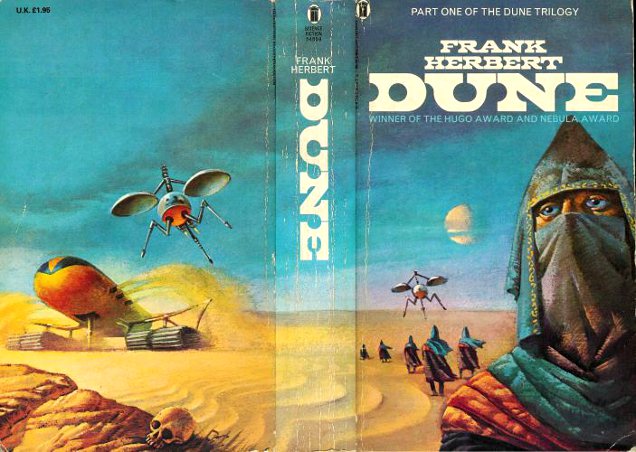
It’s basically a metaphor for oil war in the Middle East, if you want to boil it down to the absolute fundamentals. But it’s also packed full of weird philosophy and mysticism, Machiavellian political intrigue, epic battles and giant sandworms – the book’s most iconic feature. It’s a good read.
Dune has come to the screen a couple of times before. In 1984 David Lynch directed an adaptation, and it’s pretty much exactly what you’d expect – if what you’d expect is straight-up Lynchian strangeness wrapped in space opera trappings. If you ever wanted to see Lynch stock players Kyle McLachlan, Jack Nance, Dean Stockwell, and Everett McGill tricked out like they’re at a Star Wars-themed bondage party, or Patrick Stewart charge into battle with a gun in one hand and a pug in the other, this is the movie for you. It also has Sting in a rubber jockstrap. It has its fans. I’m one of them. But it is not, by any measure, a successful adaptation, although its visual iconography is absolutely stunning.
Dune came to the small screen in 2000 courtesy of The Sci-Fi Channel as it was then known (it’s Syfy now, for no good reason). Their three part miniseries was a more narratively faithful adaptation, which pleased some fans. It was also ugly, moribund, talky, and drab, which displeased everyone else. Frank Herbert’s Dune, to give it its full title, is written and directed by John Harrison, stars William Hurt, Alec Newman, Saskia Reeves, and Ian McNiece, and is terrible. It was followed in 2003 by a sequel miniseries, Children of Dune, which adapts Herbert’s Dune Messiah and Children of Dune (of course), the next two books in the Dune cycle. It is also best avoided.
The most fascinating Dune movie is, of course, one that doesn’t exist – just like Villeneuve’s Dune doesn’t actually exist right now, which lets us have fun spinning out theories and thinkpieces like, well, this one. In this particular case, though, there’s a documentary about it.
Released in 2013, Jodorowsky’s Dune details the efforts of Chilean lunatic (and we mean that in the nicest and most reverent way) Alejandro Jodorowsky to mount a production of Dune back in the ‘70s. Never a man to be shackled by such paltry notions as practicality or even possibility, the El Topo director envisioned a 14 hour epic that would literally change the world, inculcating audiences with a heady mix of Herbert’s philosophies and Jodorowsky’s own quasi-shamanistic spiritual theories. The cast was to include Salvador Dalí, Orson Welles, Gloria Swanson, David Carradine, Mick Jagger, and Udo Kier. Jodorowsky tapped famed fantasy and sci-fi artists H. R. Giger, Chris Foss and Jean Giraud to design the project, with music to be supplied by Pink Floyd and Magma. It was… well, just look at the trailer.
What we might see in a Denis Villeneuve version
But now we’re getting a new Dune a Denis Villeneuve Dune, and thank god for that. After all, it could have been Peter Berg calling the shots, given that he was attached to the project back in 2008, and we tremble to think what a version of Dune from the director of Battleship and Mile 22 would look like. Perhaps Marky Mark would be Duke Leto Atreides.
Exactly what Villeneuve’s take on the material might resemble, though, we have almost no idea. The facts on the ground are scarce; apart from the fact that the upcoming film is the first part of a two-movie adaptation of the first novel in the series, all else is conjecture. Hazarding a guess, the previous iterations will only have a bearing on the film’s visual style in that they’ll be what Villeneuve and his team are rowing away from. This Dune will need to stake out its own stylistic identity, and so the outré, imperialistic costumes and grotesque makeup of the ’84 iteration will probably not be echoed here. Similarly, anyone clamouring for a cameo from Patrick Stewart (fancast as the Emperor Shaddam IV, one of the key villains) or Sting (God forbid) are barking up the wrong tree, and wrongheaded to boot – cute casting calls like that are not Dune’s style, nor Villeneuve’s.
We do have the makings of a cast, though, as announcements come dribbling out of the Legendary Pictures publicity machine and, as noted previously, it’s a hellaciously ennervating one. It also lets us extrapolate a few notions about what shape the new Dune might take.
Timothée Chalamet, Oscar-nominated for his role in Luca Guadagnino’s Call Me by Your Name is certainly having A Moment right now, and his casting as protagonist Paul Atreides marks his first time at the centre of a production of this scale. He’s also not what you might call a traditionally masculine lead, which is intriguing. Herbert’s novel kicks off when Paul is 15 and although he racks up a few years and an impressive amount of military, political and mystical power over the course of the story, he’s never really a rote action hero. A close analogue might be Peter O’Toole in Lawrence of Arabia, which also ties in nicely with the whole oil war metaphor. Chalamet’s an excellent fit for the part; if nothing else the now 23-year-old actor will probably be able to play 15 into his mid-30s.
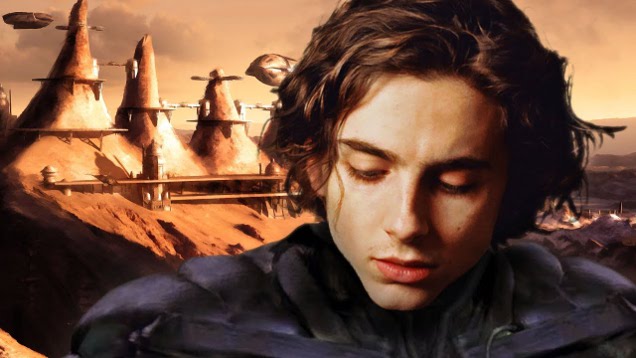
Dune being concerned with warring noble dynasties, Paul’s parents feature heavily, and the overarching plot is deeply concerned with bloodlines and heredity (it’s… complicated). In Villeneuve’s film, Paul’s father, Duke Leto Atreides, will be played by Oscar Isaac (Star Wars, Ex Machina), while his mother, the concubine Lady Jessica, will be played by Rebecca Ferguson (Mission: Impossible, The Greatest Showman).
Canny casting will mitigate the ‘White Saviour’ trope
The two actors’ unquestionable talents aside, it’s a canny bit of casting that helps mitigate one of the charges most readily leveled at Dune<: that it’s yet another example of the hoary White Saviour Trope, in which an enlightened and intrepid white hero encounters a more “primitive” culture, rises to a position of leadership among them, and elevates their whole society by dint of his sheer European-ness. By casting the Guatemalan Isaac and the Swedish Ferguson as Paul’s parents, the film puts him at least half a step removed from basic Caucasian blandness – and hopefully puts the film more than a few steps away from the rather unfortunate implications of the original source (to be fair, Herbert interrogates the hell out of the trope eventually, but that’s a couple of doorstopper novels down the track, and we may never get there cinematically).
The casting of the Fremen leader Stilgar and Chani, Paul’s Fremen love interest, shows further consideration of the optics of race in the film, with the Spanish Javier Bardem (No Country for Old Men, Biutiful) and African-American Zendaya (Spider-Man: Homecoming, The Greatest Showman), respectively, taking on the roles. This actually marks the first time that Fremen, a fictional people largely based on Arabic and Bedouin culture, have been played by people of colour.
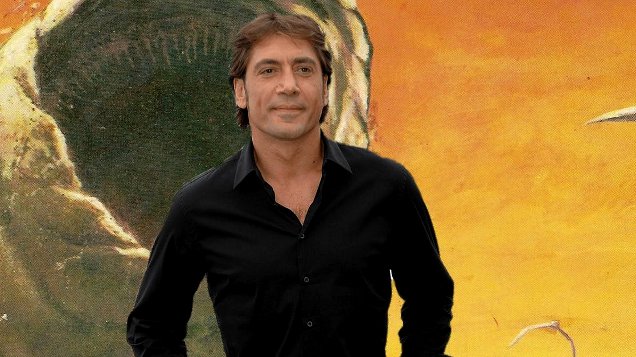
Yes, race is casting is a thorny and frequently uncomfortable topic of discourse, but with Dune it’s particularly relevant. We’re not just talking about the possibility of Idris Elba’s James Bond or Michael B. Jordan’s Superman, but a source novel that explicitly deals with themes of heredity, dynasty, and colonialism. It’s literally about powerful families warring for a valuable chunk of territory inhabited by a disenfranchised native population. Colour-blind casting doesn’t fly here – what’s required is a sensitivity to these themes and these issues, which will hopefully result in a film where the Fremen aren’t a horde of dirtied-up white guys (all due love to David Lynch, but 1984 was certainly a less enlightened time).
You could make the argument that worrying about this sort of thing is PC posturing or SJW virtue signaling, but you’d be wrong. This isn’t about representation – or at least not wholly. It’s about transporting these themes and ideas from the book to the screen in a thoughtful and challenging way.
The problem with the Harkonnens
Which doesn’t mean you don’t need a good straight up villain or two, which is where the Harkonnens come in. Dune loses a lot of its subtlety when it comes to the Harkonnen family, who may as well be called House Murderstab.
Currently two of the three key Harkonnen roles have been filled, with Swedish acting legend Stellan Skarsgård (Thor, Ronin) playing the murderous and Machiavellian Baron Vladimir, while Dave Bautista (Blade Runner 2049, Guardians of the Galaxy) down for the Baron’s murderous and notably less Machiavellian nephew, “Beast” Rabban. The Baron’s other nephew, the saturnine Feyd Rautha, who was originally played by Sting, has yet to be cast, but you better believe people have Strong Opinions on the matter (if we might make a suggestion? Ezra Miller).
However, potential problems hove into view when you consider that, as written, Baron Harkonnen is a predatory homosexual given to pederasty and incest, an unrepentant rapist and murderer. Prior adaptations have leaned into his sexuality to differing degrees, with Lynch’s in particular embracing the archetype of the depraved gay sadist. It’s not a particularly good look in the cold light of 2019, and this is not an element that the casting news can shed any light on. It’s going to come down to the writing and filmmaking as to whether this characterisation will fly in the current era, or will come across as an unfortunate throwback stereotype.
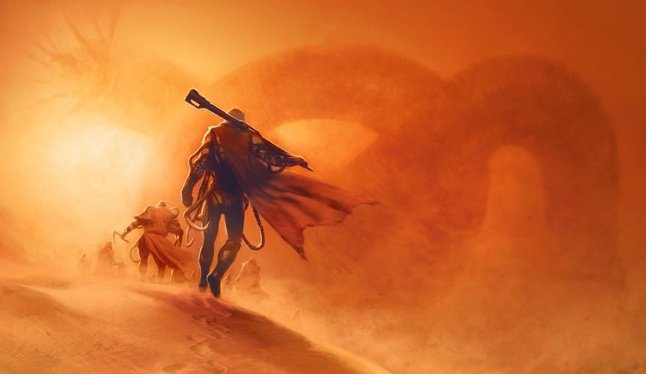
But issues like this are why the notion of a modern Dune adaptation is so exciting. Frank Herbert’s novel is so clearly not ripe for easy adaptation. It’s a big, complex, challenging and, yeah, problematic book – and it’s going to make for a big, complex, challenging, and problematic film. Some of the ideas that Herbert was grappling with over 50 years ago are sure to enrage pundits on both ends of the political spectrum – progressives are not going to enjoy some of his notions about gender, while conservatives are surely going to have something to say about the whole universe-wide jihad the whole story leads up to. There’s something for everyone to froth about.
What form these themes will take on the screen, though? How they’re going to be mediated through modern cultural norms and Villeneuve’s own specific worldview? That’s anyone’s guess. Can’t wait to find out, though.
Now tell us who’s gonna play Gurney Halleck, for crying out loud.















